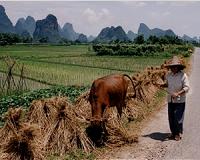| . |  |
. |
Davos, Switzerland (AFP) Jan 26, 2011 After its extraordinary 30-year surge in export-driven growth, China needs a new round of reform as it shifts from life as an emerging giant to that of an established developed power. Business leaders, politicians and academics gathered in Davos for the annual World Economic Forum remain in awe of China's economic miracle, but see clouds on the eastern horizon as Beijing adapts to life as a global power. A manufacturing economy that once relied on endless cheap labour now has an ageing population, and China's success has created global trade imbalances that have undermined its customers' economies and trading currencies. The former outsider is now seen as sharing responsibility to help preserve global stability -- which, in the eyes of its Western rivals and partners, means allowing its currency to rise and boosting domestic demand. Faced with inflation and a possible asset bubble, Chinese business leaders -- as last year, a major presence in Davos -- broadly agree with the need for greater currency flexibility and a greater reliance on domestic demand. But they also warn the West not to push their leaders to change too fast, fearful of a repeat of the crises that brought Japan's rise to a halt 20 years ago and shattered the South East Asian "Tiger economies" in 1997. In particular, there should be no attempt to rush China into making the renminbi fully convertible or to allow it to appreciate too fast. "It cannot happen very quickly, but now I feel the Chinese government is in a way trying to make it happen in the next few years," Wang Boming, economist and editor of China's Caijing business magazine, told AFP. "Every year, the appreciation process is going to accelerate," said Boming, one of the pioneers of China's early stock markets. "It's about your financial system. If you manage your financial system in a effective way, I really doubt it can damage us. Chinese regulators, in a very gradual process, have to get used to this. "It takes time, but somehow I see light at the end of the tunnel, it's probably in five years," he told AFP. Earlier, at a well attended off-the-record seminar, senior Chinese entrepreneurs and academics broadly agreed, and suggested that after China's economic revolution it was time for social and political change. They said they see China eventually dropping its famous "one child" policy, as the elderly population finds it harder to staff the country's huge manufacturing plants, a take steps to boost domestic demand. Better health care and more grandchildren could persuade the Chinese to spend more of their savings, and a more innovative industry could provide opportunity for the country's vast population of highly-qualified graduates. "China can't rely on an export growth model," former Chinese deputy central bank chief Zhu Min told a Davos panel, noting how other Asian countries reliant on exports were hit after the 2008 crisis. "Until you have been hit badly, you won't see the changes," he said. Business leaders on the off-the-record panel said China had begun moving away from a pure role as the manufacturer of Western, Japanese and Korean designed goods, towards developing respected brands of its own. And they boasted its highly-educated workforce -- the product, they joked, of a generation of pushy and ambitious "Tiger Mothers" -- were branching into software applications for consumer platforms such as the iPad.
Share This Article With Planet Earth
Related Links The Economy
 China to roll out nationwide resource tax: report
China to roll out nationwide resource tax: reportBeijing (AFP) Jan 26, 2011 China will roll out a resources tax across the country over the next five years as Beijing tries to boost local government income and reduce reliance on land sales, state media said Wednesday. The government will also overhaul levies on high-income earners and push forward reforms of real estate taxes, the China Daily said, citing finance minister Xie Xuren. Further details were not provided ... read more |
|
| The content herein, unless otherwise known to be public domain, are Copyright 1995-2010 - SpaceDaily. AFP and UPI Wire Stories are copyright Agence France-Presse and United Press International. ESA Portal Reports are copyright European Space Agency. All NASA sourced material is public domain. Additional copyrights may apply in whole or part to other bona fide parties. Advertising does not imply endorsement,agreement or approval of any opinions, statements or information provided by SpaceDaily on any Web page published or hosted by SpaceDaily. Privacy Statement |